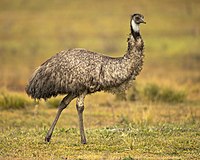
Photo from wikipedia
Abstract The anti-inflammatory property of ratite oils as well as its ability to act as a penetration enhancer makes it an ideal agent to be used in transdermal formulations. The… Click to show full abstract
Abstract The anti-inflammatory property of ratite oils as well as its ability to act as a penetration enhancer makes it an ideal agent to be used in transdermal formulations. The present study aims to develop an effective transfersomal delivery of 4-hydroxytamoxifen (4-OHT), an anti-cancer drug, using ratite oil as a carrier agent for the treatment of breast cancer (BC). The 4-OHT transfersomes were prepared with and without ratite oils using soy phosphatidylcholine and three different edge activators (EAs) in five different molar ratios using the rotary evaporation-ultrasonication method. Optimal transfersome formulations were selected using physical–chemical characterization and ex vivo studies. Results from physical–chemical characterization of the developed formulations found sodium taurocholate to be the most suitable EA, which recorded highest entrapment efficiency of 95.1 ± 2.70% with 85:15, (w/w) and lowest vesicle size of 82.3 ± 0.02 nm with 75:25, (w/w) molar ratios. TEM and DSC studies showed that the vesicles were readily identified and present in a nearly perfect spherical shape. In addition, formulations with emu oil had better stability than formulations with ostrich oil. Physical stability studies at 4 °C showed that ratite oil transfersomes were stable up to 4 weeks, while transfersomes without ratite oils were stable for 8 weeks. Ex vivo permeability studies using porcine skin concluded that 4-OHT transfersomal formulations with (85:15, w/w) without emu oil have the potential to be used in transdermal delivery approach to enhance permeation of 4-OHT, which may be beneficial in the treatment of BC.
Journal Title: Journal of Liposome Research
Year Published: 2020
Link to full text (if available)
Share on Social Media: Sign Up to like & get
recommendations!